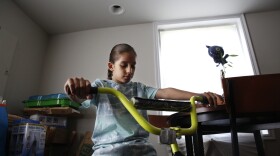A lot of work must be done to address the needs of young people facing mental health issues during the pandemic, members of Austin's mental health community say. There are also not enough mental health professionals to address those needs.
At an online event Wednesday, Kimberly Wilson, who supervises licensed mental health professionals for Austin ISD, said children's social-emotional development has suffered.
“You have to remember students have been away from face-to-face academic learning for over a year and half,” she said. “So what we have seen is not only poor peer relationships, but emotional developmental loss, as well.”
Experts have been raising concerns, in particular, about the rise in suicide and suicide attempts among young people.
According to the Centers for Disease Control and Prevention, emergency room visits for suspected suicide attempts increased by 31% among 12- to 17-year-olds in 2020 compared to the year before. Between February and March 2021, the agency found, “suspected suicide attempt ED visits were 50.6% higher among girls aged 12–17 years than during the same period in 2019.”
Greg Hansch, executive director of NAMI Texas, said mental health conditions are common among adolescents. He said they're also treatable and should be addressed sooner rather than later.
“The earlier identification and intervention occurs,” he said, “the better chance we have at reducing the impact of a mental health condition.”
Hansch said he’s concerned many young people don’t have access to health care services. He said half of U.S. children with a mental health condition are not receiving mental health care, and Black and Latino kids are even less likely to have access to treatment.
And while many groups in Austin are ramping up services and resources for schools and families, workforce issues remain a hurdle.
Luanne Southern, executive director for the Texas Child Mental Health Care Consortium, said the shortage of health care professionals is a nationwide issue.
“The workforce is a huge issue — not just recruitment of new individuals to work in the field, but also retention of individuals,” she said.
Alison Mohr Boleware, government relations director for the Texas chapter of the National Association of Social Workers, said there are only about 1,500 social workers employed at schools across the state.
“Sadly there are not enough school social workers for every school,” she said.
Mohr Boleware said her organization has been pushing the state Legislature to include a definition of school social work services in the state’s education code. She said once that definition is put into law, it should be easier to hire social workers.
Democratic state Rep. Donna Howard of Austin said lawmakers have been paying attention to the mental health crisis in Texas, but their response has been a mixed bag.
She said more resources have been allotted to mental health in the past year, but the Legislature has also passed laws harmful to young people in the LGBTQ community or who are racial minorities, which can deeply affect their mental health.
“I am proud of what we have done, but I am also not so proud of some of the things we have done that have contributed to the problem,” Howard said. “And this generation of youth is navigating the bitter divide politically that we all find ourselves in.”





















